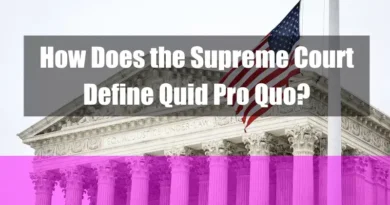Do ut Des vs Quid Pro Quo
”Do ut des” and “quid pro quo” are Latin phrases describing reciprocal exchanges. “Do ut des” translates to “I give so that you may give” and originates from ancient Roman religious practices, where offerings were made to deities with the expectation of receiving blessings in return. In legal contexts, it refers to mutual contracts where each party’s performance is contingent upon the other’s. “Quid pro quo” means “something for something” and denotes an exchange of goods or services where one transfer is contingent upon the other.
While both expressions involve reciprocity, “do ut des” emphasizes the act of giving to receive, whereas “quid pro quo” highlights a direct exchange or substitution. In English usage, “quid pro quo” has become more prevalent in terms of such reciprocal arrangements.
Takeaways
| Aspect | Do ut Des / Quid Pro Quo |
|---|---|
| Translation | “Do ut des” means “I give so that you may give,” while “quid pro quo” means “something for something.” |
| Origin | “Do ut des” originates from ancient Roman religious and legal practices, whereas “quid pro quo” became prominent in medieval and early modern legal systems. |
| Core Concept | “Do ut des” is based on reciprocity, where one party gives with the expectation of receiving something in return, even if not explicitly agreed upon. “Quid pro quo” refers to a direct and clearly defined exchange where both parties provide something of equivalent value. |
| Context of Use | “Do ut des” is used in religious, ethical, and contractual contexts, while “quid pro quo” is more common in legal, business, political, and everyday transactions. |
| Nature of Exchange | “Do ut des” often implies an expectation of return but is not always legally binding. “Quid pro quo” involves an explicit agreement where each party knows what they will receive. |
| Legal Relevance | Do ut des” appears in contract law, particularly in agreements where obligations are mutually dependent. “Quid pro quo” is widely used in business deals, corporate negotiations, and political agreements. |
| Religious and Ethical Relevance | “Do ut des” is seen in religious practices, charity, and moral philosophy. Quid pro quo” can have ethical concerns, especially when linked to bribery or corruption. |
| Common Applications | “Do ut des” is often used in charitable giving, social contracts, and religious traditions. “Quid pro quo” applies to business agreements, political negotiations, and legal contracts. |
| Potential for Misuse | “Do ut des” can be misinterpreted as a purely transactional approach to faith or giving. “Quid pro quo” is frequently associated with unethical practices like bribery and favoritism. |
| Modern Examples | “Do ut des” can be seen in tax-deductible donations, religious offerings, and acts of social goodwill expecting recognition. “Quid pro quo” appears in corporate partnerships, lobbying, and workplace promotions based on favors. |
| Philosophical Influence | “Do ut des” aligns with Aristotle’s idea of justice and Kantian reciprocity, while “quid pro quo” relates to contract law principles and fair trade ethics. |
Introduction
Definition of “Do ut Des”
“Do ut des” is a Latin phrase that translates to “I give so that you may give.” It originates from Roman law and religious practices, where offerings were made with the expectation of receiving something in return. This principle is often associated with reciprocal obligations, particularly in contracts and moral philosophy.
The concept implies that the giver provides something with the understanding that a return favor or benefit will follow, even if not explicitly agreed upon in advance. It is often referenced in contexts involving conditional exchanges or mutual benefit agreements in modern legal and ethical discussions.
Definition of “Quid Pro Quo”
“Quid pro quo” is another Latin phrase that means “something for something.” It describes an exchange where one party provides a service, benefit, or item in direct exchange for another service, benefit, or item. Unlike “do ut des,” which can have an implied expectation of reciprocation, “quid pro quo” usually involves a more explicit and immediate exchange agreement.
This term is frequently used in business, legal, and political contexts, where mutual exchanges of goods, services, or favors occur. However, it can also have negative connotations, especially when referring to unethical or corrupt transactions, such as bribery or inappropriate political favors.
Historical Origins
“Do ut Des” in Ancient Roman Religion and Law
The phrase “do ut des” has its roots in ancient Roman religion and legal practices. In religious ceremonies, Romans offered to gods, believing that these deities would grant them protection, favor, or other divine blessings in return. This transactional nature of religious worship reinforced the concept of reciprocity, shaping Roman moral and social behavior.
In Roman law, “do ut des” evolved into a principle of contract formation. It was used to describe bilateral agreements where both parties had mutual obligations. This principle was particularly relevant in contracts concerning sales, employment, and debt settlements. Roman legal scholars, such as Ulpian and Gaius, explored the nuances of “do ut des” in defining legal reciprocity and obligations.
“Quid Pro Quo” in Latin and Early Legal Systems
“Quid pro quo” also originates from Latin but gained prominence in medieval and early modern legal systems. In its earliest usage, the phrase was associated with trade and commercial transactions, where merchants and traders exchanged goods or services under mutually agreed-upon terms. The idea was simple: one party offers something of value, and in return, the other party provides something of equivalent value.
Over time, “quid pro quo” became a fundamental principle in contract law, particularly in English common law. It was used to determine the fairness of contractual agreements, ensuring that both parties benefited equally from a transaction. However, as legal systems evolved, the phrase also became associated with unethical practices, such as bribery and favoritism, especially in political and corporate dealings.
Linguistic and Semantic Differences
Literal Translations and Meanings
Both phrases originate from Latin, but their translations and meanings highlight distinct nuances:
- “Do ut des” – “I give so that you may give.”
- “Quid pro quo” – “Something for something.”
The key difference lies in their intent and application. “Do ut des” implies an expectation of reciprocity, often based on faith, trust, or tradition, whereas “quid pro quo” denotes an immediate and clearly defined exchange.
Contextual Usage in Classical and Modern Latin
In classical Latin, “do ut des” was frequently used in religious and moral texts, emphasizing the idea of reciprocal relationships between individuals, institutions, or deities. The phrase maintained a philosophical and ethical tone, often linked to moral obligations rather than strictly legal contracts.
On the other hand, “quid pro quo” was more practical and transactional. It was commonly used in legal and commercial documents to describe formal agreements. Over time, as Latin influenced English and other European languages, “quid pro quo” retained its legal and business connotations, while “do ut des” remained more philosophical and ethical in nature.
In modern usage, “quid pro quo” is more widely recognized, particularly in political and legal contexts. It often appears in discussions about corruption, workplace agreements, and contractual negotiations. “Do ut des,” however, is less commonly used outside academic, religious, and legal discussions.
Legal and Ethical Implications
“Do ut Des” in Contract Law
In legal contexts, “do ut des” is a foundational principle in contract law, particularly in civil law traditions. It describes contracts where both parties have mutual obligations, ensuring that each party’s performance is dependent on the other’s. This principle is commonly applied in bilateral agreements, such as:
- Sales contracts, where payment is made in exchange for goods or services.
- Employment agreements, where an employer provides compensation in return for labor.
- Service contracts, where professional services are exchanged for fees.
The enforceability of “do ut des” agreements depends on both parties’ mutual consent and fulfillment of obligations. Courts often evaluate whether the exchange was fair and whether both sides acted in good faith.
“Quid Pro Quo” in Business and Political Transactions
“Quid pro quo” is widely used in business and political transactions. In business, it refers to negotiated exchanges, such as:
- Corporate partnerships, where companies exchange resources or services for mutual benefit.
- Sponsorship deals, where financial support is given in exchange for promotional exposure.
In politics, “quid pro quo” can have both legal and unethical implications. While lawful agreements exist, such as lobbying efforts where interest groups support politicians in exchange for policy consideration, unethical practices include:
- Bribery, where financial or material incentives influence official decisions.
- Political corruption, where officials grant favors in return for personal or campaign benefits.
Case Studies: Legal Precedents and Court Rulings
- United States v. Sun-Diamond Growers of California (1999) – Clarified the distinction between legal gifts and illegal quid pro quo bribery.
- McDonnell v. United States (2016) – Highlighted the difficulty in defining unlawful quid pro quo in political corruption cases.
Religious and Philosophical Perspectives
“Do ut des” is deeply rooted in religious traditions, where offerings are made to deities with the expectation of divine favor. This principle appears in:
- Hinduism, where rituals and donations are believed to bring good karma.
- Christianity, where charitable acts are seen as a way to receive divine blessings.
- Ancient Roman religion, where sacrifices were made in hopes of divine protection.
Ethical Considerations in Reciprocity and Fair Exchange
Ethically, “do ut des” promotes fairness in social contracts. Philosophically, “do ut des” underscores the ethical framework of reciprocity. Aristotle, in his “Nicomachean Ethics,” discusses reciprocal justice, emphasizing balanced exchanges in societal interactions. Immanuel Kant further explores this in his moral philosophy, advocating for actions that respect mutual benefit and uphold moral duty, aligning with the inherent fairness suggested by “do ut des.”
Modern Applications
Do ut Des in Charitable Giving and Social Contracts
In contemporary charitable giving, the “do ut des” principle manifests when donors contribute with the expectation of receiving something in return, such as social recognition, tax benefits, or personal satisfaction. This reciprocal dynamic can enhance philanthropic efforts by providing donors with tangible incentives. For instance, tax deductions for charitable donations serve as a form of “do ut des,” encouraging individuals and corporations to support nonprofit organizations.
However, this expectation of reciprocity can also introduce complexities, especially when the perceived benefits to the donor overshadow the altruistic intent of giving. Studies have shown that social influences can pressure individuals into donating, potentially diminishing the intrinsic value of their contributions.
Quid Pro Quo in Business, Politics, and Everyday Transactions
“Quid pro quo,” translating to “something for something,” is a foundational concept in business transactions, politics, and daily interactions. In the business realm, it signifies an agreed-upon exchange of goods, services, or other benefits of equal or comparable value. For example, companies may engage in barter agreements where services are exchanged without monetary transactions, relying instead on the mutual benefit derived from each other’s offerings.
In politics, “quid pro quo” refers to exchanging favors or advantages, such as supporting legislation in return for political backing or contributions. While some of these exchanges are lawful, they can blur ethical lines, especially when they resemble bribery or undue influence. The legality and morality of such arrangements often depend on transparency and the nature of the exchanged benefits.
In everyday life, “quid pro quo” governs numerous interactions, from workplace promotions tied to performance to personal agreements like trading favors among friends. While these exchanges can be benign and foster cooperation, they can also lead to ethical concerns if they involve coercion or exploitation.
Controversies and Misuse
Corruption and Bribery: When Quid Pro Quo Becomes Unethical
The misuse of “quid pro quo” is most evident in corruption and bribery cases, where the exchange involves illicit or unethical benefits. In political contexts, this can manifest as officials granting favors in return for personal gains, undermining democratic processes and public trust.
Such practices can lead to clientelism, where goods and services are exchanged for political support, often resulting in governance prioritizing personal gain over public interest.
Misinterpretations of Do ut Des in Religious and Social Contexts
In religious and social contexts, misinterpretations of “do ut des” can lead to transactional approaches to faith and community interactions. For instance, individuals might engage in charitable acts primarily for personal gain, such as social status or divine favor, rather than genuine altruism.
This perspective can diminish the moral and ethical foundations of giving, reducing it to a mere tool for personal benefit rather than an expression of compassion and solidarity.
Comparative Analysis
Key Differences Between Do ut Des and Quid Pro Quo
While both phrases embody the concept of reciprocal exchange, “do ut des” is traditionally associated with voluntary giving with an expectation of return, often seen in social or religious contexts. In contrast, “quid pro quo” implies a more explicit and negotiated exchange, commonly used in legal, business, and political arenas. The former emphasizes a moral or ethical expectation of reciprocity, whereas the latter denotes a concrete agreement between parties.
Similarities and Overlapping Uses in Law and Ethics
Both concepts underscore the human inclination towards reciprocity and mutual benefit. In legal and ethical discussions, they highlight the importance of intent, transparency, and fairness in exchanges. Both can be employed to promote cooperative behavior but also pose risks when misused, leading to exploitation or corruption.
Understanding their nuances is crucial in applying them appropriately across different contexts.
Conclusion
“Do ut des” and “quid pro quo” are enduring principles that continue to shape interactions in charitable giving, social contracts, business, politics, and daily life. While they can foster cooperation and mutual benefit, their misapplication can lead to ethical dilemmas and undermine trust. Recognizing these concepts’ distinctions and appropriate applications is essential for maintaining integrity and fairness in various spheres of society.
FAQ
What is the fundamental difference between “Do ut Des” and “Quid Pro Quo”?
“Do ut Des” translates to “I give so that you may give,” emphasizing a reciprocal exchange where one party provides something with the expectation of receiving something in return. “Quid Pro Quo,” meaning “something for something,” also denotes an exchange but is more commonly used in legal and political contexts to describe mutual agreements where goods or services are traded.
How do “Do ut Des” and “Quid Pro Quo” origins differ?
“Do ut Des” is rooted in ancient Roman religious practices, describing the act of offering offerings to deities in anticipation of reciprocal favors. In contrast, “Quid Pro Quo” originated in the 16th century, initially referring to substituting one medicine for another, and later evolved to signify any reciprocal exchange.
In which contexts is “Do ut Des” predominantly used today?
Today, “Do ut Des” is primarily utilized in legal and contractual discussions to describe agreements where each party’s performance is contingent upon the other’s, highlighting mutual obligations and the expectation of reciprocal benefits.
How is “Quid Pro Quo” applied in modern settings?
“Quid Pro Quo” is frequently employed in legal, business, and political environments to describe situations where an item or service is exchanged for something of value. For example, in employment, it can refer to arrangements where job benefits are offered in return for favors, which can raise ethical and legal concerns.
Are there legal implications associated with “Quid Pro Quo”?
Yes, in legal contexts, “Quid Pro Quo” underscores the necessity of consideration in contracts, ensuring that each party offers something of value. However, in scenarios like workplace harassment, “Quid Pro Quo” arrangements, such as offering promotions in exchange for personal favors, are illegal and subject to severe penalties.
Can “Do ut Des” and “Quid Pro Quo” be used interchangeably?
While both terms involve reciprocity, they are not entirely interchangeable. “Do ut Des” is more specific to contexts involving mutual obligations with an expectation of return, particularly in legal or religious settings. “Quid Pro Quo” has a broader application, describing any reciprocal exchange, especially in business or political dealings.
How do cultural perceptions of “Do ut Des” and “Quid Pro Quo” differ?
“Do ut Des” is often viewed within the framework of formal agreements and religious practices, emphasizing structured reciprocity. “Quid Pro Quo,” however, can carry negative connotations, especially when associated with unethical practices or corruption in political and business contexts.
Are there similar phrases to “Do ut Des” and “Quid Pro Quo” in other languages?
Yes, many languages have expressions denoting reciprocal exchanges. For instance, the English phrase “tit for tat” conveys a similar meaning to both Latin terms, emphasizing the concept of equivalent retaliation or exchange.
How do “Do ut Des” and “Quid Pro Quo” relate to contract law?
Both terms underscore the principle of mutual consideration in contract law, essential for forming binding agreements. “Do ut Des” highlights the expectation of a return favor in contractual obligations, while “Quid Pro Quo” emphasizes the exchange aspect, ensuring that each party provides something of value.









